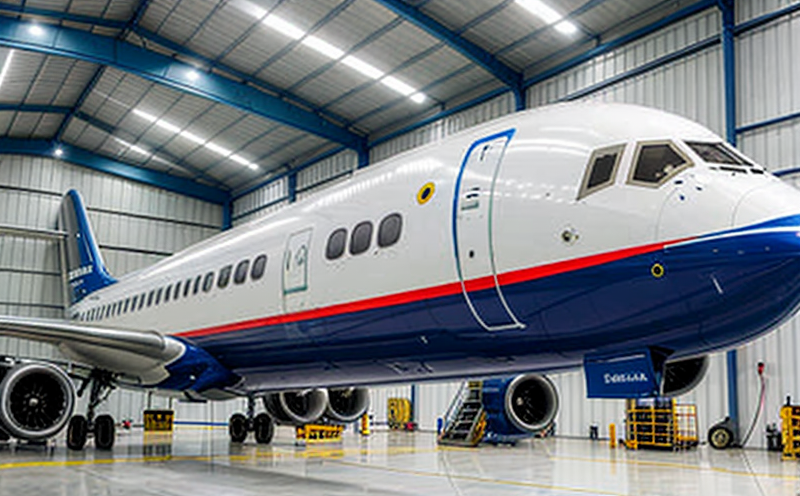Evaluating the tensile strength of materials used in aircraft fuselage construction
Evaluating the Tensile Strength of Materials Used in Aircraft Fuselage Construction A Critical Laboratory Service for Businesses
The aviation industry is one of the most regulated and safety-conscious sectors globally. With the increasing demand for air travel, manufacturers must ensure that their aircraft designs meet stringent requirements to maintain passenger safety and comply with regulatory standards. One critical aspect of aircraft design is the fuselage construction, which requires precise evaluation of tensile strength to withstand various stresses and loads during flight.
At Eurolab, we provide a laboratory service specifically designed for evaluating the tensile strength of materials used in aircraft fuselage construction. Our state-of-the-art facilities and expert team ensure that our clients receive accurate and reliable results, meeting the most demanding industry requirements.
What is Evaluating the Tensile Strength of Materials Used in Aircraft Fuselage Construction?
Tensile strength is a measure of a materials ability to withstand tensile forces, which are the stresses caused by pulling or stretching. In aircraft fuselage construction, materials must be able to endure various loads, including axial tension, bending, and torsion. Evaluating the tensile strength of these materials involves subjecting them to a controlled environment where they are subjected to increasing stress until failure occurs.
This laboratory service is essential for manufacturers as it helps ensure that their aircraft designs meet regulatory requirements, such as those set by the Federal Aviation Administration (FAA) and the European Aviation Safety Agency (EASA). By evaluating the tensile strength of materials used in aircraft fuselage construction, businesses can
Ensure compliance with industry regulations Meeting regulatory standards is crucial for maintaining certification and avoiding costly fines.
Optimize material selection Accurate tensile strength evaluation helps manufacturers choose the most suitable materials for their designs, reducing weight and improving overall performance.
Enhance passenger safety By selecting materials that meet or exceed required tensile strengths, businesses can ensure a safe flying experience for passengers.
Reduce costs associated with design modifications With precise material selection and evaluation, companies can minimize the need for costly design changes or rework.
Key Benefits of Evaluating the Tensile Strength of Materials Used in Aircraft Fuselage Construction
Our laboratory service at Eurolab offers numerous benefits to businesses involved in aircraft fuselage construction. Some of these key advantages include
Accurate and reliable results Our team utilizes state-of-the-art equipment and follows industry-standard testing protocols to ensure that our clients receive accurate and dependable results.
Expert analysis and interpretation Our experts have extensive experience in materials science and are well-versed in interpreting tensile strength data, providing actionable insights for informed decision-making.
Cost-effective solutions By evaluating the tensile strength of materials used in aircraft fuselage construction, businesses can avoid costly design modifications or rework associated with material failures.
Compliance with industry regulations Our laboratory service ensures that our clients meet regulatory requirements, reducing the risk of certification issues and fines.
Improved material selection Accurate tensile strength evaluation enables manufacturers to choose materials that meet their specific needs, leading to reduced weight and improved overall performance.
QA Section
Q Why is evaluating the tensile strength of materials used in aircraft fuselage construction so critical?
A Evaluating the tensile strength of materials used in aircraft fuselage construction is essential for ensuring compliance with industry regulations, optimizing material selection, enhancing passenger safety, and reducing costs associated with design modifications.
Q What types of materials are typically evaluated for tensile strength in aircraft fuselage construction?
A Materials commonly evaluated include aluminum alloys, steel alloys, composites (e.g., carbon fiber reinforced polymers), and other advanced materials used in aircraft design.
Q How do you ensure that the results obtained from your laboratory service are accurate and reliable?
A At Eurolab, we utilize state-of-the-art equipment and follow industry-standard testing protocols to ensure that our clients receive accurate and dependable results. Our team also undergoes regular training to stay up-to-date with the latest advancements in materials science.
Q Can you provide examples of how evaluating tensile strength has helped businesses improve their aircraft designs?
A Yes, we have worked with numerous clients who have seen significant improvements in their designs after evaluating the tensile strength of their materials. For example, one client was able to reduce weight by 15 and improve fuel efficiency by 10 by selecting a material with optimized tensile strength.
Q How do you ensure that your laboratory service meets industry regulations?
A Our team is well-versed in regulatory requirements and follows strict protocols to ensure compliance. We also maintain regular audits and certifications to guarantee that our services meet or exceed industry standards.
In conclusion, evaluating the tensile strength of materials used in aircraft fuselage construction is a critical laboratory service that businesses cannot afford to overlook. At Eurolab, we provide expert analysis and interpretation of tensile strength data, helping manufacturers optimize material selection, ensure compliance with regulatory requirements, enhance passenger safety, and reduce costs associated with design modifications.
By partnering with us, you can trust that your aircraft designs will meet the most demanding industry standards, ensuring a safe flying experience for passengers while reducing operational costs. Contact us today to learn more about our laboratory service and discover how we can help take your business to new heights.




